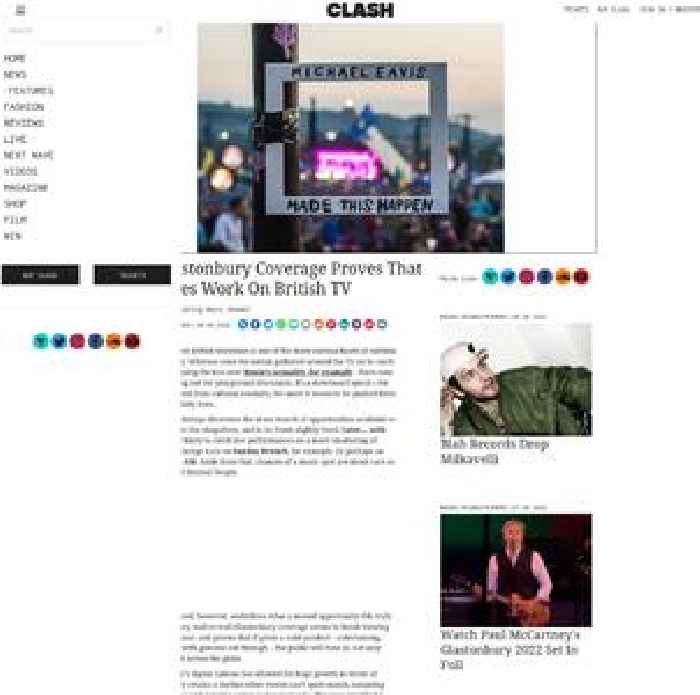
BBC's Glastonbury Coverage Proves That Music Does Work On British TV

So, start commissioning more shows!
The decline of music on British television is one of the more curious facets of cultural life in the 21st century. Whereas once the nation gathered around the TV set to catch Top Of The Pops – arguing the toss over *Bowie’s sexuality, for example* - there now isn’t the same lightning rod for playground discussion. It’s a downward spiral – the more music is side-lined from cultural conduits, the more it seems to be pushed from the centrality of our daily lives.
A quick glance at the listings illustrates the sheer dearth of opportunities available to musicians – aside from the ubiquitous, and to be frank slightly tired, *Later… with Jools Holland*, you’re likely to catch live performances on a mere smattering of shows. An artist like George Ezra on *Sunday Brunch*, for example. Or perhaps an indie band on *Soccer AM*. Aside from that, chances of a music spot are about rare as a dry eye at the end of Normal People.
The weekend just passed, however, underlines what a missed opportunity this truly is. The BBC’s exemplary, wall-to-wall Glastonbury coverage seems to break viewing records every single year, and proves that if given a solid product – entertaining, well-researched, and with genuine cut-through – the public will tune in, not only across the country but across the globe.
The growth of the BBC’s digital options has allowed for huge growth in terms of audience. Glastonbury retains a mythos other events can’t quite match, conjuring fantastic performances and genuine water-cooler moments. This year provided a virtually incalculable number of headlines: *Olivia Rodrigo* singing ‘Fuck You’ alongside *Lily Allen*, *Phoebe Bridgers *decrying the Supreme Court, *Paul McCartney’s* astonishing headline set, and *Kendrick Lamar’s* climactic triumph all spring to mind.
- - -
- - -
Yet what the BBC does best is offer choice and insight. Fans sitting at home can move from stage to stage, allowing the festival to unfold at their own pace. By empowering the viewer, the BBC ensure that everyone receives a unique Glastonbury experience, blending the immense audience power that the broadcaster still retains with an increasing desire for flexibility, and modernity.
The results speak for themselves. In 2019 – the last year before the pandemic – the BBC posted *record-breaking Glastonbury viewing figures*, with *Kylie Minogue* achieving the biggest ever audience threshold for a Worthy Farm slot. 2020 – a year in which the festival didn’t even take place – saw the BBC piece together the Glastonbury Experience, which proved to be an enormous ratings smash. A look at era-defining sets from across the ages, *it gathered an audience of more than 10 million viewers*, ranking alongside top sporting events in terms of engagement.
- - -
- - -
This year could well top all that. Paul McCartney’s headline set proved to be an incredible social media moment, while Kendrick Lamar’s epic performance of ‘Humble’ from Glastonbury has notched up almost a quarter of a million views in less than 24 hours. The demand is clearly there.
It’s remarkable, then, that isn’t repeated elsewhere. Why not some form of similar engagement at a smaller, left-field festival, for example? Or – better yet – start a weekly show, bringing together the best artists around, the ones who can truly command attention. It could rank alongside the towering American late night chat show spots, who seem able to make or break artists at will. You could merge the digital with the organic, fusing the heritage of the BBC with a glance at modern, future-facing British music. You could even call it Top Of The Pops, if you like. But for God’s sake stop relegating British music to the background – it deserves so much better.
- - -
- - -
Words: *Robin Murray*

